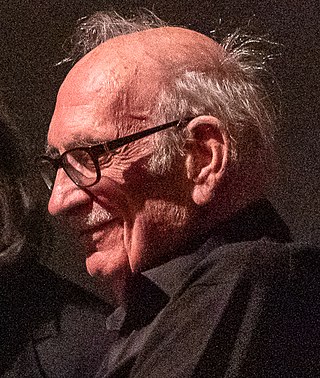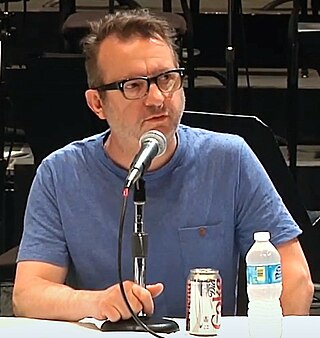Related Research Articles

George Henry Crumb Jr. was an American composer of avant-garde contemporary classical music. Early in his life he rejected the widespread modernist usage of serialism, developing a highly personal musical language which "range[s] in mood from peaceful to nightmarish". Crumb's compositions are known for pushing the limits of technical prowess by way of frequent use of extended techniques. The unusual timbres he employs evoke a surrealist atmosphere which portray emotions of considerable intensity with vast and sometimes haunting soundscapes. His few large-scale works include Echoes of Time and the River (1967), which won the 1968 Pulitzer Prize for Music, and Star-Child (1977), which won the 2001 Grammy Award for Best Contemporary Classical Composition; however, his output consists of mostly music for chamber ensembles or solo instrumentalists. Among his best known compositions are Black Angels (1970), a striking commentary on the Vietnam War for electric string quartet; Ancient Voices of Children (1970) for a mixed chamber ensemble; and Vox Balaenae (1971), a musical evocation of the humpback whale, for electric flute, electric cello, and amplified piano.

Mark-Anthony Turnage is an English composer of contemporary classical music.
Alfred Whitford (Fred) Lerdahl is an American music theorist and composer. Best known for his work on musical grammar, cognition, rhythmic theory and pitch space, he and the linguist Ray Jackendoff developed the Chomsky-inspired generative theory of tonal music.
Mario Davidovsky was an Argentine-American composer. Born in Argentina, he emigrated in 1960 to the United States, where he lived for the remainder of his life. He is best known for his series of compositions called Synchronisms, which in live performance incorporate both acoustic instruments and electroacoustic sounds played from a tape.

Ulrich Leyendecker was a German composer of classical music. His output consisted mainly of symphonies, concertos, chamber and instrumental music.
Margaret Brouwer is an American composer and composition teacher. She founded the Blue Streak Ensemble chamber music group.
Christopher Marshall is a New Zealand classical music composer who resides in Orlando, Florida, United States.

Lior Navok is an Israeli classical composer, conductor and pianist. He was born in Tel Aviv. Navok studied composition privately with the Israeli composer Moshe Zorman, and completed a Bachelor's degree at the Jerusalem Academy of Music and Dance, where he studied composition and conducting. He later completed he studied for a Master's and Doctorate at the New England Conservatory, where he studied with John Harbison.
David Horne is a Scottish composer, pianist, and teacher.
David Frederick Stock was an American composer and conductor.
Gary Alan Kulesha is a Canadian composer, pianist, conductor, and educator. Since 1995, he has been Composer Advisor to the Toronto Symphony Orchestra. He has been Composer-in-Residence with the Kitchener-Waterloo Symphony (1988–1992) and the Canadian Opera Company (1993–1995). He was awarded the National Arts Centre Orchestra Composer Award in 2002.

David Serkin Ludwig is an American composer, teacher, and Dean of Music at The Juilliard School. His uncle was pianist Peter Serkin, his grandfather was the pianist Rudolf Serkin, and his great-grandfather was the violinist Adolf Busch. He holds positions and residencies with nearly two dozen orchestras and music festivals in the US and abroad. His choral work, The New Colossus, was performed at the 2013 presidential inauguration of Barack Obama.
Betty Olivero is an Israeli composer and music educator.
Richard Festinger is an American composer of contemporary classical music, pianist and educator.
Ivan Fedele is an Italian composer. He studied at the Milan Conservatory.

Gideon Gee-Bum Kim is a Korean-Canadian classical music composer, conductor, and music educator and founder of the Toronto Messiaen Ensemble. His music draws on his Christian faith and shows a connection of the rich musical heritage of Korea and new compositional techniques, especially in the field of heterophony texture and all of this with live and emotional imagination.
References
Presser. https://web.archive.org/web/20070711120929/http://www.presser.com/Composers/info.cfm?Name=DAVIDCRUMB
Inside Oregon. http://darkwing.uoregon.edu/newscenter/4.2.05-MusicToday.html%5B%5D
University of Oregon. http://www.uoregon.edu/~drcrumb/honors.html